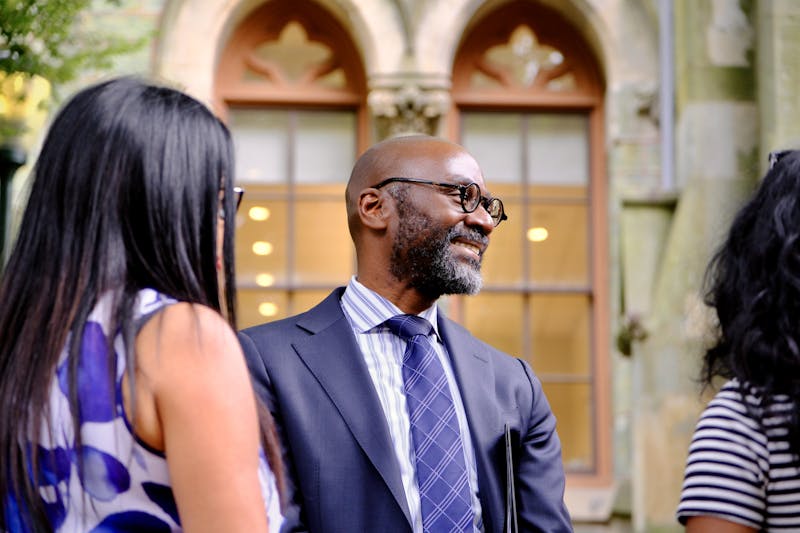
Associate Ombudsman Marcia Martinez-Helfman (left) and Ombudsman Lynn Hollen Lees (right).
Credit: Julio SosaLast Thursday afternoon, students gathered on College Green to protest racial discrimination on college campuses, standing in solidarity with students at the University of Missouri and Yale University. The protest touched on some of the deepest, most controversial issues that students face — race, inequality and freedom of expression.
Yards away, nestled obscurely in the Duhring Wing of the Fisher Fine Arts Library, a History professor and an employment lawyer were hard at work hearing, considering and resolving complaints, some of which dealt with those very problems.
Their office, cozily furnished and finely decorated, is designed for safe and open conversation. Confidentiality is a key aspect of the Office of the Ombudsman — when students, faculty and staff come to the office to seek help with interpersonal issues, they are assured in almost all cases that whatever they say will never leave the room.
Penn Ombudsman and History professor Lynn Hollen Lees, who has held the role since 2014, explained that the Office of the Ombudsman works to “help people think through situations of stress or conflict in which they’re involved, to help deescalate conflict and to help people move forward to a resolution.”
The Office does not perform formal investigations, but will help members of the Penn community by referring them to other offices, like the Office of Student Conduct or the Women’s Center, or facilitating informal mediation through meetings or shuttle diplomacy.
So if a student comes to the office with a complaint that one of their professors has made a racially insensitive comment, Lees said, the Office of the Ombudsman would listen to the student’s concerns, then refer them to the Office of Affirmative Action or address the issue itself, depending on what the student wanted to do.
There are only two exceptions to the confidentiality rule — complaints that place anyone in danger, or situations in which there is a legal obligation to report an issue. Otherwise, it is entirely up to the individual making the complaint to determine whether he or she would like to make a formal accusation or complaint.
The Office also strives to maintain neutrality in all its actions.
“We don’t take sides; we’re not an office that advocates for anything other than fairness and promoting a climate for success within the University,” said Associate Ombudsman Marcia Martinez-Helfman, a lawyer with a background in human resources. “We don’t advocate for a particular point of view, for a person, for a department, for a school, for the University.”
Of the 137 complaints received by the Office between July 1, 2014 and June 30, 2015, 59 came from staff, 31 came from faculty, six came from post-doctorates and 36 came from students. The most common category of complaint was “Employment, General” with 49 complaints, followed by “Academic Procedures” with 23 complaints and “Abrasive/Abusive/Inappropriate Behavior” with 17 complaints.
The reason for the comparatively low portion of student complaints, Lees said, is because students — particularly undergraduates — have a number of other places on campus where they can voice their concerns. But for the most contentious issues, such as free speech, Lees said that the Office can play an important role.
“I think this whole area of free speech, and violations of free speech, is an area where the Ombuds Office could be very important because what one wants to have happen on campus is individuals taking responsibility for their behavior and respecting the rights of others,” Lees said. “It’s often not a question of right or wrong ... it’s a question of discussion; it’s a question of engagement.”
And instead of escalating tensions by making an accusation or doling out consequences, the Office of the Ombudsman aims to decrease them.
“We try to turn the heat down,” Martinez-Helfman said. “We want things to settle down and enable people to understand each other — even if it’s to agree to disagree, to do so in a respectful way.”
The Daily Pennsylvanian is an independent, student-run newspaper. Please consider making a donation to support the coverage that shapes the University. Your generosity ensures a future of strong journalism at Penn.
DonatePlease note All comments are eligible for publication in The Daily Pennsylvanian.







